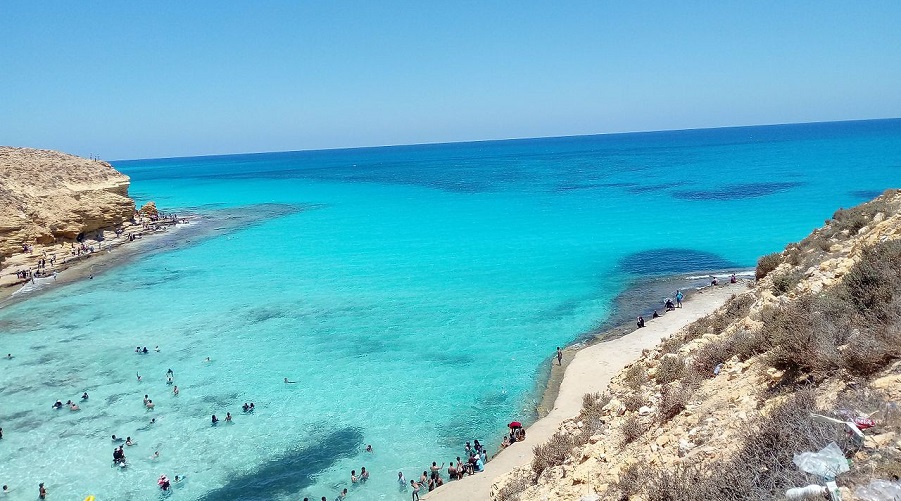
Ageeba beach on Egypt’s Mediterranean coast. Photo by Aya Gallab, Wikimedia Commons.
Egyptian fisheries need to be better managed to secure the overall health of the Mediterranean Sea’s marine living resources, new research has found.
In a recent paper in the journal Ocean and Coastal Management, researchers with the Sea Around Us initiative at the University of British Columbia’s Institute for the Oceans and Fisheries and the Arab Academy for Science, Technology and Maritime Transport reconstructed Egypt’s marine fisheries catches from the Mediterranean in the last 100 years and found strong evidence of resource overexploitation. Such overexploitation has pushed fishers to go farther and deeper, increasingly resorting to species lower in the food chain.
“The Egyptian Mediterranean marine fisheries consist of a century-old, predominantly trawl fishery as well as other fisheries, such as longlining, purse-seining and multi-gear traditional fisheries,” said Dr. Myriam Khalfallah, who led the study as a post-doctoral fellow with the Sea Around Us. “From 1920 to 2019, 3.8 million tonnes of fish and invertebrates were removed from Egypt’s Mediterranean waters. We identified major peaks in catches followed by drastic declines caused by various external events and increased fishing pressure.”
Decreased landings and fishing of juvenile fish in shallow waters were identified as early as the mid-1920s, as the trawl fleet and the duration and number of its fishing trips grew.
“This was a sign that something was amiss,” Khalfallah said. “There was a bit of a recovery during World War II and a rapid expansion right after, only to experience another drop starting in the mid-1960s caused by the new Aswan High Dam, which blocked the flow of nutrients from the Nile into the sea.”
The sardine fishery was the most affected one, declining from 30 per cent of the commercial catch from 1950 to 1965 to less than 4 per cent in 1968.
Fisheries catches eventually returned to pre-dam levels in the late 1980s, likely because of fertilizers applied in farms of the Nile Delta, which ended up enriching the surrounding waters and fueling the growth of sardines and other fish populations. But in the 2000s, catches again began to fluctuate, demonstrating that the resurgence from two decades prior was transient.
“There has been a catch decline of nearly 50 per cent between 2011 and 2019, despite increasing fishing pressure,” Khalfallah noted. “Stock assessments of commercially important species along the Egyptian Mediterranean coast confirm our evaluation and attribute the decline to overexploitation. Even some of the newly established invasive species appear to be overfished.”
fishing down the food web
The overexploitation of fish populations was further corroborated when the researchers computed an indicator, the ‘Marine Trophic Index,’ which indicates the average position most landed fish occupy in the food chain.
“The Marine Trophic Index shows that there was fishing up the food chain up to the mid-1950, due mainly to geographic expansion of fisheries,” said Dr. Daniel Pauly, co-author of the study and the Sea Around Us principal investigator. “But since the 1970s, without new areas to expand into, excessive fishing induced a ‘fishing down’ effect that is reflected in lower values of the Marine Trophic Index.”
Fishing down the food web is the process whereby fisheries in a given ecosystem, having depleted the larger predatory fish on top of the food web, turn to increasingly smaller species, finally ending up with previously spurned small fish and invertebrates. Fishing down, combined with the changes in species composition caused by the warming of the Mediterranean, is expected to increasingly impact Egypt’s fisheries.
In addition to this, the paper also determined that the mean temperature of catch has been steadily increasing by 0.07°C per year since 1987, underscoring the profound effects of climate change on the region’s marine ecosystems and fisheries.
“There is a serious need for the Egyptian authorities to take the management of the fisheries seriously, as the alternative implies the loss of an important source of food and livelihoods,” Pauly said.
The paper “Once upon a century, the Egyptian Mediterranean fisheries (1920-2019), as affected by ‘fishing down’ and climate change” will be published in Ocean and Coastal Management, doi: https://doi.org/10.1016/j.ocecoaman.2023.106831

